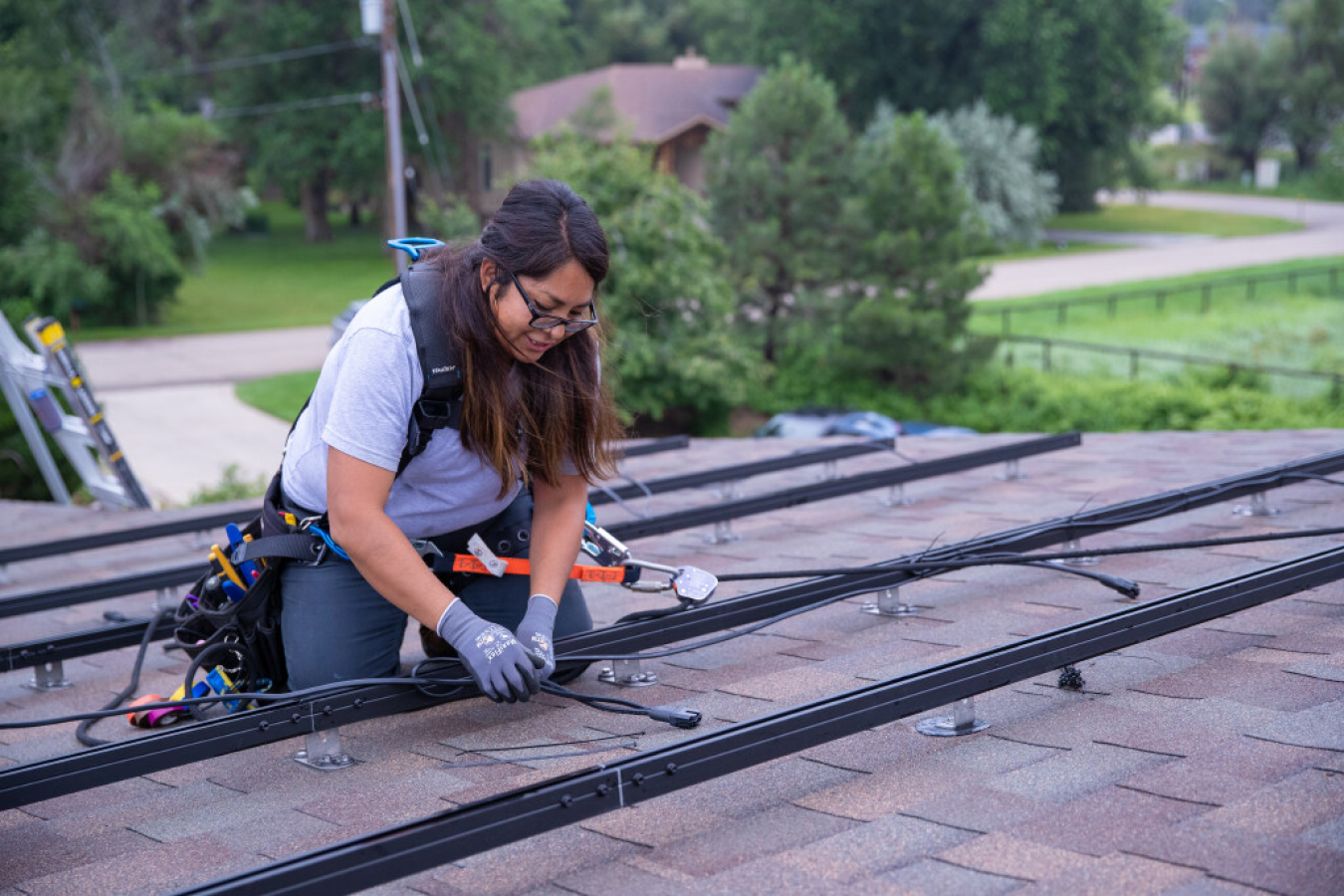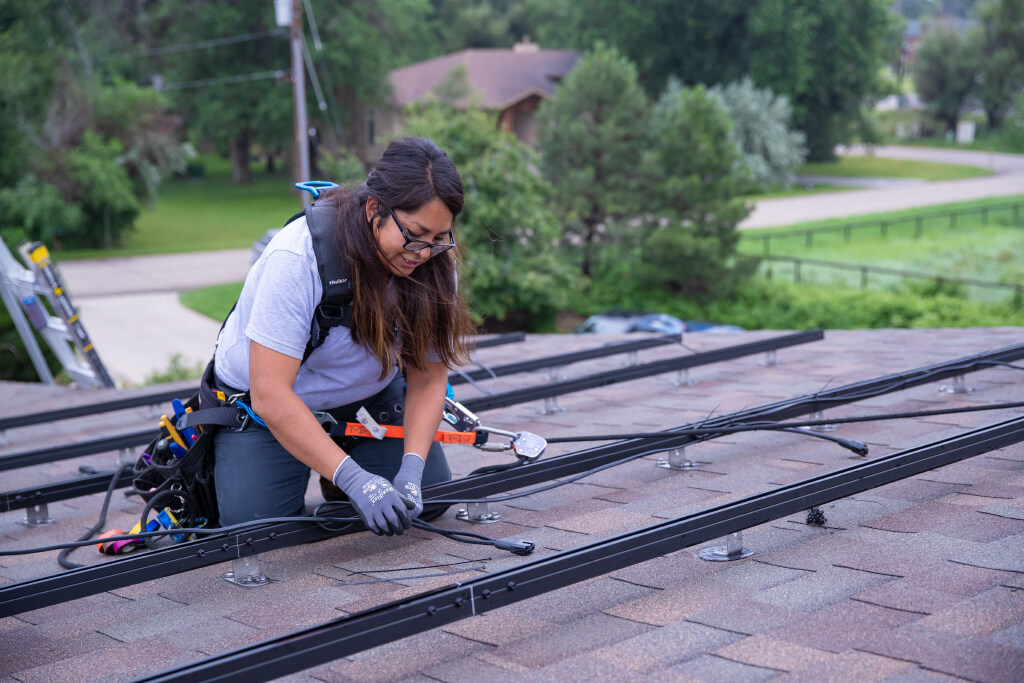
Meeting our climate goals and decarbonizing the power sector will create millions of clean energy jobs. The U.S. Department of Energy (DOE) expects the solar industry will need to grow from more than 330,000 employees now to between 500,000 and 1,500,000 workers by 2035 to achieve the country’s decarbonization goals. According to the 2024 U.S. Energy and Employment Jobs Report, electric power generation jobs grew at double the national rate. Within that sector, solar energy had the largest and fastest growth, increasing by 5.3% from 2022-2023.
As job opportunities expand, the clean energy industry should prioritize recruiting workers who have been underrepresented, underserved, and economically excluded. Women and minority groups are still underrepresented in the solar industry. For example, women (30%) and Black or African American (8%) in the solar workforce were much less represented than in the national workforce in 2023.
The DOE Solar Energy Technologies Office (SETO) has gathered information from industry, labor unions, training organizations, community organizations, academia, and other stakeholders regarding the biggest barriers to creating accessible solar jobs that provide competitive wages and benefits while meeting the growing demand for workers. From a GED to a PhD, there are ways for everyone to participate in the clean energy transition. Check out a few of the solar careers that SETO supports through funding opportunities, prizes, and partnerships.
Solar Installers
With solar energy deployment increasing rapidly, there is a huge demand for solar installers. Installers have some of the most visible jobs in the industry, physically assembling the solar systems in accordance with codes and safety standards. A junior or senior installer position can also be a stepping stone to certified electrician, project manager, or site assessor jobs.
Through the Advancing Equity through Workforce Partnerships funding program, SETO funds a variety of projects designed to create more opportunities for individuals from all backgrounds to pursue careers in the solar energy industry. The 12 projects in this portfolio include a union pre-apprenticeship program in Crater Lake, OR; a community-led solar training and job placement program in Baltimore, MD; and a multi-sector training partnership in Chicago, IL.
Manufacturing Operators and Technicians
SETO supports U.S. innovators and manufacturers as they scale up to meet the needs of the clean energy transition. New and expanded facilities across the country have increased the domestic manufacturing capacity, so the workforce needs to grow accordingly. Equipment maintenance technicians perform maintenance and repairs on manufacturing equipment and have mechanical knowledge and electrical skills. Some experience in a manufacturing environment is usually desirable before obtaining these positions.
In March 2024, SETO launched the American-Made Upskill Prize for the Solar Manufacturing Workforce to prepare workers for these and other highly skilled jobs in the solar manufacturing workforce. To compete, U.S. solar manufacturers and training organizations such as community colleges or unions propose plans to upskill current employees or attract and train new employees through pre-certification programs, specialized equipment training, or recruitment efforts. SETO announced the first two winners and opened Round 2 of the prize on July 16.
Corporate Professionals
Solar companies need logistics specialists, marketing professionals human resources professionals, and other corporate positions to keep business operations running smoothly. These jobs span from overseeing warehouse operations to communicating externally about the business. Corporate roles can be entry-, mid-, or senior-level positions.
SETO launched the Solar Ready Vets program in 2014 to connect veterans, transitioning military service members, and military spouses with career training, professional development, and employment opportunities in the solar industry. The Interstate Renewable Energy Council (IREC) maintains the network and has expanded its suite of trainings to support returning veterans. One program in the network, the Solar Ready Vets Fellowship, prepares transitioning service members for project management, operations and logistics, communications, and other roles in the solar industry. As of October 2023, IREC has placed nearly 100 service members with solar employers.
Photovoltaics Researchers
At the front end of solar development, scientists and engineers are leading the way to drive down the costs of solar-generated electricity by analyzing and improving efficiency, durability, and reliability of current and emerging solar technologies. Research workforce programs at SETO aim to advance research and development to support the U.S. solar industry, and the office’s portfolio of national lab and academic R&D projects across solar technologies supports STEM education from undergraduate to post-doctoral levels.
One example of SETO’s STEM efforts is the Hands-On Photovoltaic Experience (HOPE) workshop. At this annual workshop, the National Renewable Energy Laboratory hosts doctoral students in chemistry, engineering, materials science, and other sciences for an immersive classroom and lab experience where they learn skills relevant to their PhD projects and the broader solar industry. The students have access to tools that may not be available at their universities, meet new contacts and collaborators, and learn about solar career opportunities.
Learn more about SETO research to support solar workforce development and a map of solar careers from IREC.


